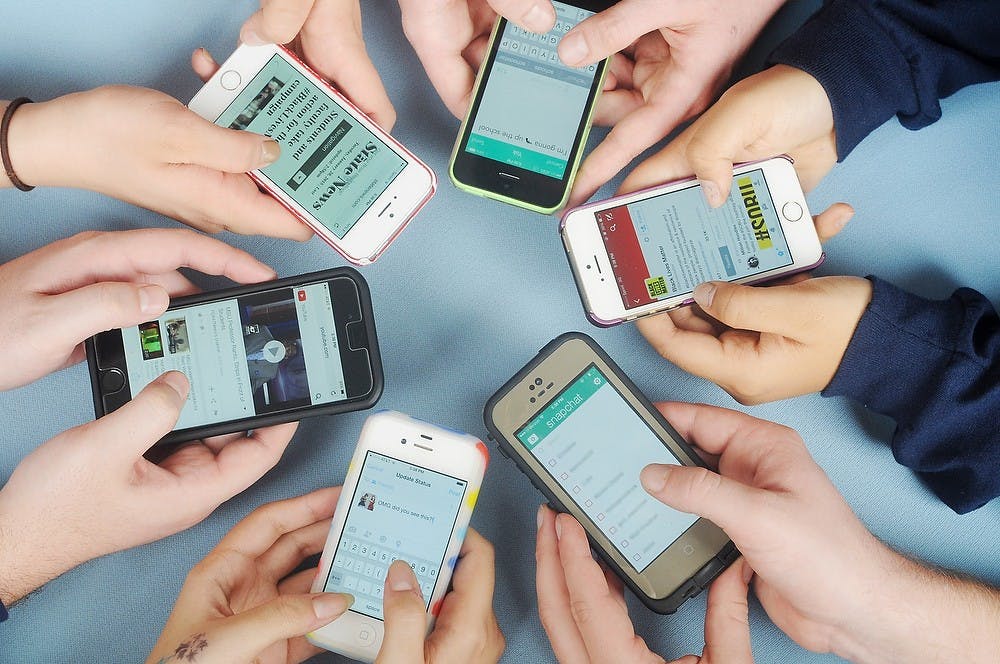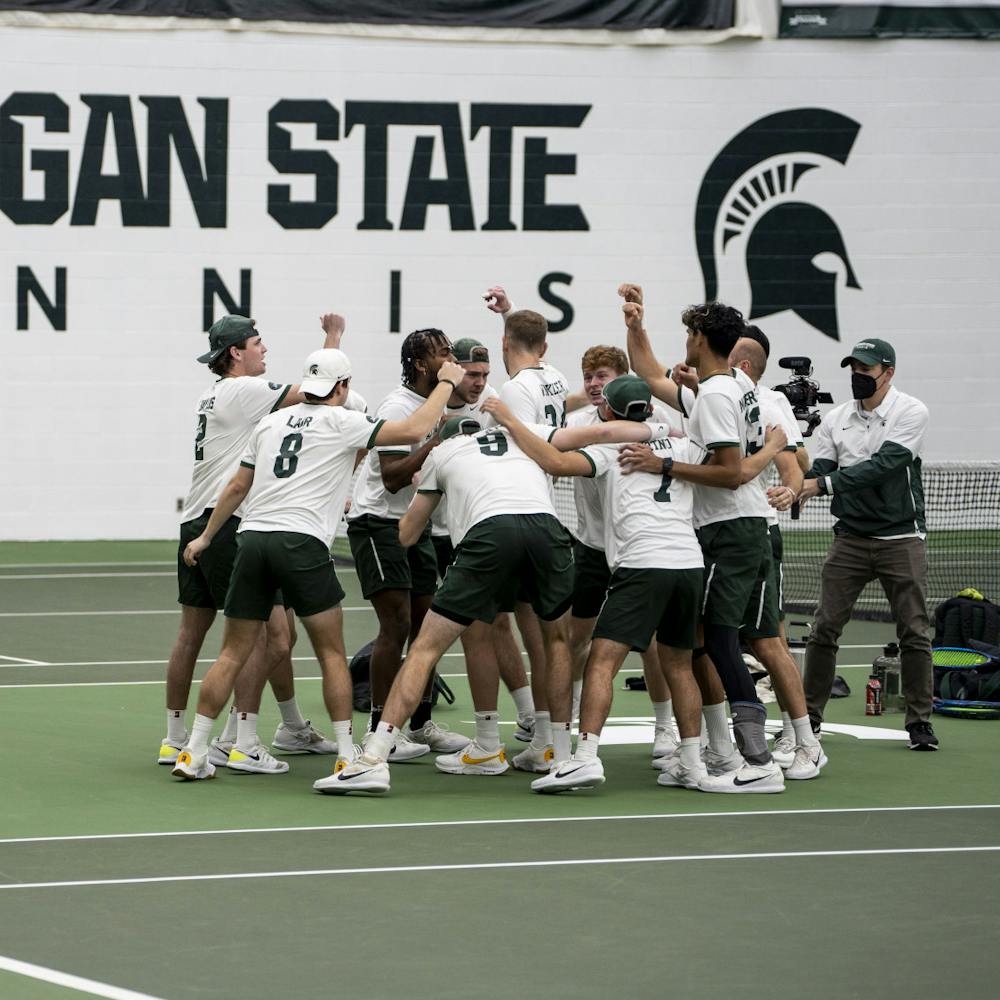In the end, it’s really just four lines.
Two horizontal, two vertical, slightly slanted and crossed together. That’s all a hashtag is, technically. But for today’s generation, the hashtag is so much more than four lines. It’s a conversation starter. It’s a way to break news and mobilize action.
And students are using social media for so much more than posting “Man Crush Mondays” or pictures of the antics from the night before.
“It’s a good way to let people know what’s going on in their community,” physics junior Kurt Hamel said.
It can also bring people together from all walks of life and all continents of the globe. Journalism professor Bonnie Bucqueroux said her YouTube channel and news blog have helped her reach out to readers across the globe.
“I’ve had connections with people around the world (whom) I would have had no other way (of knowing),” Bucqueroux said.
Movements
Sites like Twitter — the main home of the ubiquitous hashtag — can be an effective medium to rally support for a common cause.
#BlackLivesMatter is one movement that has gained widespread attention through social media.
“BlackLivesMatter did a very good job of raising awareness about some of the issues of over policing, militarized policing, racist policing (and) racial profiling,” Bucqueroux said.
According to Topsy.com, a Twitter analytics website, Twitter users tweeted the hashtag #BlackLivesMatter more than 6,000 times on Dec. 23, which was 20 days after a grand jury decided not to indict officer Daniel Pantaleo in the death of Eric Garner.
Since Christmas, #BlackLivesMatter hasn’t eclipsed more than 3,200 tweets per day, according to the website.
And for some students, social media isn’t capable of telling all sides of a story and create tension along racial lines when it comes to controversial topics.
“I think people my age use social media both positively and negatively,” journalism sophomore Kevyn Roberts said. “It’s always that one person who will take what you say out of context and try to argue with you ... especially if it’s someone of the other race.”
Roberts said she has conversations about societal issues with her friends and family but prefers to leave her opinion off social media because people lack knowledge.
“I try not to just believe everything I read or pay to much attention to it,” Roberts said.
Hamel was just one of the many students to take a stand against fall commencement speaker George Will, who in a Washington Post column said being a campus rape survivor was a “coveted status” of “victimhood.”
Hamel said he posted a petition on the MSU events and parties page on Facebook and also linked to an event page for an alternate graduation ceremony.
“This is one of the big, first events like a protest that I have ever seen on social media that I have acted in,” Hamel said, adding that he is more accustomed to seeing posts about music and parties.
Thanks in part to social media, students who did not support Will as a commencement speaker were able to have their own graduation.
In protest of George Will’s commencement speech, five students attended an alternate graduation and were recognized by 30 MSU faculty members, who shook the hands of the graduates.
Hashtags like #ItsOnYouMSU and #RespectSurvivors were a unifying mechanism which gave the movement and the protestors an identity.
“It helped a lot, it got the word out, it let people know what was going on,” Hamel said. “Otherwise people would have no idea.”
Other hashtags that have become popular include the #ItsOnUs campaign against sexual assault, and the female empowerment hashtag #yesallwomen, referring to a statement that all women have been harassed by men at some point in their lives.
Prisoners of the moment
Social media can be a good way to garner interest, but some say it might not be the most effective way to sustain interest.
“There are dramatic cases where there’s a lot of conversation, but does the conversation actually translate into action?” Bucqueroux said.
Constantly refreshing newsfeeds and timelines also have made it difficult for social media users to promote and focus on one issue.
“It’s always something smaller that has more spotlight than the bigger issues,” Roberts said. “I know for a while people didn’t even know about the stuff happening in Ferguson with Mike Brown, it was heart wrenching.”
Bucqueroux, who personally uses social media to promote societal issues, agreed that people can be fickle and lose interest quickly.
“It can be faddish sometimes. The hard part is translating that into coherent social action,” Bucqueroux said. “The way in which social action takes place is when people become educated and reach a critical mass on certain issues.”
Bucqueroux pointed out the #BringBackOurGirls movement, which became popular on Facebook last April after nearly 300 female students were kidnapped from school in Nigeria.
Despite compiling more than 237,000 “likes” on the official group page, nearly 300 days later the girls have not been found and the discussion on social media has taken a backseat to newer trends.
Live from the classroom
Public policy senior Evan Schrage’s first day of his IAH 207 class with English professor William Penn led to a viral video with strong repercussions.
Penn went on what some called an anti-Republican rant during the class. Schrage took out his phone and captured Penn’s comments. The video, which was about nine minutes long, showed Penn saying that Republicans “raped the country.”
The video went viral, and Penn was temporarily removed from his teaching duties, a decision many students supported after seeing the video.
The rant also drew national reaction from a number of news outlets.
“Whether it is on the far left or far right, the professor shouldn’t use his pulpit to spew that kind of hate,” Schrage previously told The State News.
Students took to social media during another incident when mathematics professor John McCarthy began yelling and reportedly stripped naked at the Engineering Building in October 2012.
The incident went viral on the social networking site Reddit, where a student posted a photo with the caption, “My math teacher just stripped naked during class and was arrested! Go MSU!”
The pitfalls
It’s relatively common but potentially frightening knowledge that what someone posts in the Internet could very well remain in cyberspace forever.
Some social media apps have tried to adapt to this fear. Snapchat, for example, allows users to send photos or videos that only appear on the recipient’s screen for a chosen number of seconds before disappearing.
Media and information professor Charles Steinfield said this is an interesting concept.
He said it appeals to people because we like to be in control of our personal data.
“I think it actually reveals that people don’t like the fact that everything they do in a fun way is potentially going to come back and haunt them,” Steinfield previously told The State News.
Yik Yak is an app that is referred to by many as “anonymous Twitter,” in which postings can be shared with anyone in proximity, but with protected identity.
For some students, like arts and humanities freshman Aaron Sanford, the app is a good way for students to express themselves in college without fearing repercussions.
“Sometimes you want to talk about school, a class or your job, but you can’t tweet about it because you can get in trouble, so you can just yak about it,” he previously told The State News.
But that anonymity doesn’t always protect users from criminal repercussions or scandal.
The MSU chapter of the Pi Kappa Alpha fraternity was slammed with controversy after a post on the anonymous smart phone app Yik Yak alluding to a video of a woman performing oral sex on a man was circulated last week.
The fraternity has been accused on anonymous message boards online like Yik Yak of drugging the female in the video and filming the video non-consensually.
President of Pi Kappa Alpha Christopher Kojaian alleged the video originated at another university with the same acronym as MSU, and there are several other “MSUs” with their own chapters of the fraternity.
And on Nov. 24, a vague shooting threat prompted a lockdown for East Lansing Public Schools. The threat said “I’m gonna (gun emoji) the school at 12:15 p.m. today,” according to court records.
MSU police Capt. Penny Fischer previously told The State News that the entire ordeal lasted around 30 minutes from the time MSU received the threat and the time the suspect, later identified as former finance freshman Matthew Michael Mullen, 19, was apprehended. He eventually pled guilty.
But social media interaction doesn’t have to be negative.
During the bomb threat on Nov. 25, The State News tweeted a request to its followers to keep track what buildings had gone under lockdown.
The response was overwhelming.
Dozens of students sent messages from their respective classroom buildings, some with photo attachments, keeping their fellow Spartans in the loop.
Social media has the ability to make the world smaller, but keeping the attention of the digital generation might pose a new problem.
“How do we take that next step and translate awareness into action? I think we don’t know yet,” Bucqueroux said. “That’s the missing piece in social media that we haven’t worked out yet.”







